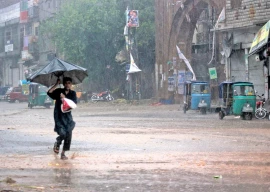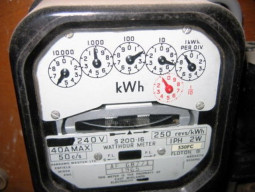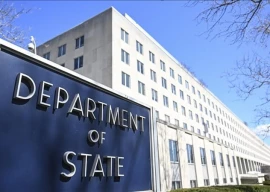
Iran has stood at the threshold to the Bomb for well over two years. In 2010 it had more than enough low enriched uranium (LEU, some 2,152 kilograms) to make its first bomb’s worth of weapons-grade uranium. Enhancement to the required quality could have been done in roughly 10 weeks if this LEU had been fed into the 4,186 centrifuges that it was then operating. But Iran furiously rejects allegations that it seeks the Bomb. It says the LEU is only for generating nuclear electricity.
America has probably guessed Iran’s intentions correctly. Why would Iran, a major exporter of gas and oil — but with very limited natural uranium resources — be willing to put its life on the line simply for the sake of nuclear electricity? During this American election year, things could boil over. Presidential aspirants are competing to out-macho one another over fighting a new war with Iran. President Obama, who retreated from his earlier promise for a Palestinian state, may now bow again before America’s pro-Israel lobby. He has announced new financial and commercial sanctions on companies dealing with Iran. The EU will decide this month whether to cooperate with the US and ban Iran’s oil exports.
But America’s moral position — and the tactics it uses to dissuade Iran — are morally indefensible. The US has given the green light to Israel’s campaign of secret assassination of Iranian nuclear scientists, injection of the Stuxnet virus, and periodically threatens to bomb Iran. While Iran has not attacked any other country in centuries, the United States overthrew Iran’s democracy in 1953 and installed a dictator who ensured that American corporations would have a near monopoly over Iranian oil. It supplied weapons to Saddam Hussain in his war against Iran, put Iran on the “axis of evil”, falsely blamed it for 9/11, flies drones over Iran, imposed sanctions, and provocatively sends its aircraft carriers up and down the Persian Gulf.
In my opinion, Iran’s quest for the bomb does it — and the world — no service. The world needs less nukes, not more. Yet, given the regime’s obstinate insistence, there appear to be only two possible outcomes. Continuing on its present path, Iran will likely become the world’s 10th nuclear state over the next few years. Bad as this would be, it would not be terrible. In all likelihood Iran would then moderate its dangerous rhetoric and, like other existing global nuclear rivalries, this one too could be managed.
On the other hand, an Israeli attack — whether aided or not by the US — would be truly terrible. The Middle East would become a permanent war zone. The third Gulf War would surely devastate Iran. But today it is in a position to inflict much greater damage on the US than were Iraq or Libya. The US would plunge into an economic crisis the likes of which it has not seen before. The last bits of its post-withdrawal strategy from Afghanistan would be shredded to pieces.
What about Pakistan? Where does it picture in a conflict shaping across its borders? In a country that is more anti-American than Iran, one would have expected overwhelming public and government support for Iran.
But Pakistan’s enthusiasm for Iran’s bomb has been subdued. The local media — which happily takes up anti-American causes — has been remarkably silent. Officially, Pakistan defends Iran’s right to nuclear technology. Further, as Iran acknowledges, Pakistan had secretly helped Iran’s nuclear weapon programme until the mid-1990s through the A Q Khan network. But, even at that time, voices within the Pakistani establishment spoke against giving nuclear support to Iran. US pressure was partly the reason but so was the discomfort with Iran, a Shi’ite state.
These suspicions were confirmed by confidential American cables revealed by Wikileaks. They detail Pakistan’s efforts to dissuade Iran from pursuing its weapons program. General Pervez Musharraf, prime minister Shaukat Aziz and foreign minister Khurshid Kasuri held at least seven meetings, whether face-to-face or by telephone, with the Iranians. There were 11 meetings with the Americans in 2006 alone. Pakistani officials also served as interlocutors between Iran and the US. Mr Kasuri provided a list of other reasons why Pakistan was so keen to prevent Iran from acquiring nuclear weapons. “We are the only Muslim country [with such weapons],” he said, ‘“and don’t want anyone else to get it.”
Pakistan’s real dilemma comes not primarily because of America — with which it is now rapidly cutting off ties — but Saudi Arabia. It knows that if Iran chooses to cross the nuclear threshold, the Saudis would seek to follow suit. Pakistan would then have to choose sides between a Shia neighbour and a Sunni state that has been its benefactor. Former Saudi intelligence chief Prince Turki bin Sultan was on the mark when, speaking about Pakistan and Saudi Arabia, he said “It’s probably one of the closest relationships in the world between any two countries”. The Saudi opposition to Iranian nuclear weapons is intense. Again, thanks to WikLleaks, it is now well known that that King Abdullah of Saudi Arabia had repeatedly urged the US to destroy Iran’s nuclear program and “cut off the head of the snake” by launching military strikes. Last June, the influential former head of Saudi intelligence and ambassador in London and Washington, Prince Turki bin Faisal, spoke to an audience from the British and American military and security community at Molesworth air force base in England where he described “Iran as a paper tiger with steel claws”. He accused Iran of using these claws for its “meddling and destabilising efforts in countries with Shi’ite majorities”. After saying that “in a certain sense, Saudi Arabia and Iran are uniquely positioned to be at odds”, Faisal went on to warn that his country could embark on the path to nuclear weapons if Iran made them.
So what happens if Iran goes nuclear and Saudi Arabia wants to follow? What could be the Saudi path and what role is Pakistan likely to play? This shall be taken up next week.
Published in The Express Tribune, January 16th, 2012.



















COMMENTS
Comments are moderated and generally will be posted if they are on-topic and not abusive.
For more information, please see our Comments FAQ